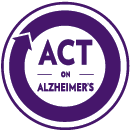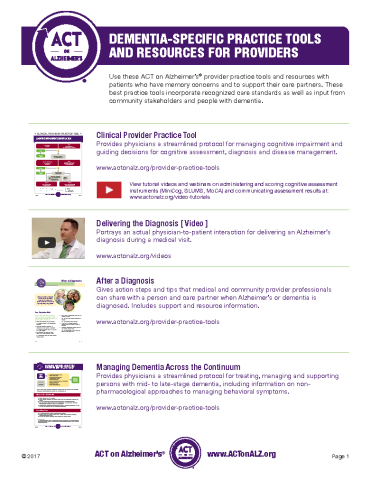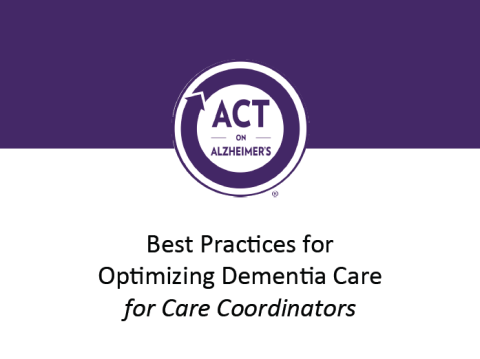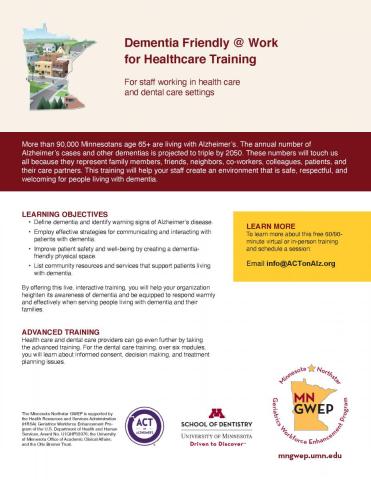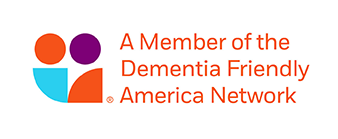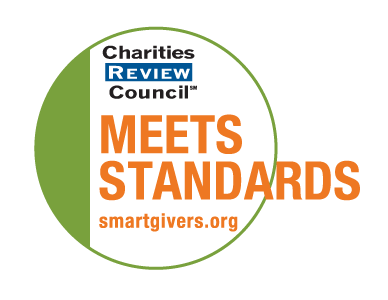PROVIDER RESOURCES
Dementia Education
ACT on Alzheimer's provides ready-to-use webinars and access to in-person training delivered by volunteer or professional trainers.
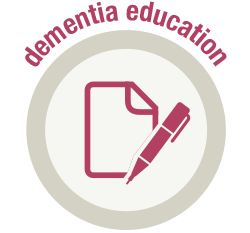
Webinars
Advanced Clinical Training for Medical Providers Optimal Care of Memory-impaired Persons
These webinars help providers understand when and how to apply practice tools in their day-to-day work with patients, including managing functional changes and behaviors that can complicate care and negatively impact outcomes. CME credit available.
Access these webinars:
Webinar 1: Best Practices for Detection and Early Management of Dementia
Webinar 2: Managing Dementia through the Continuum
Best Practices for Optimizing Dementia Care for Care Coordinators
This webinar trains care coordinators on the rationale for using objective cognitive assessment instruments, administration & scoring of the MiniCog, communicating assessment results to clients and physicians, and employing best practices in post-diagnostic care for people with dementia and their care partners.
Dementia Curriculum for Educators
Developed by leading experts in Minnesota, this 10-module curriculum can stand on its own or be integrated into complementary education offerings. Educators, practicing professionals, and students across multiple disciplines will benefit from advancing their knowledge of dementia.
Dementia Trainings for Direct Care Staff (revised 4/23/18)
The value of understanding Alzheimer's disease and dementia is immeasurable for staff who care for people living with the disease. Direct-care workers, such as nurses, nurse aides, home health aides, and personal- and home-care aides, make up the majority of staff who deliver health care services to older adults, including those with Alzheimer's or other dementias. These workers have demanding, and important jobs. Often, they have not received the training needed to provide quality dementia care. When direct-care staff receive training, research shows positive benefits.
Effective January 1, 2016, the state of Minnesota has a dementia training law setting standards for staff working in housing with services settings. ACT on Alzheimer’s has compiled a list of dementia trainings to help you find the right training for your needs.
In-Person Trainings
Dementia Friendly for Healthcare for All Staff
This 60- or 90-minute training is presented by volunteers who are trained by ACT on Alzheimer's to lead the sessions.and is designed for the entire clinic team (clinical and non-clinical staff members). Topics include: dementia and the warning signs of Alzheimer’s disease, effective strategies for communicating and interacting with patients with dementia, creating a dementia-friendly environment, and community resources and supports. A case study is included in the 90-minute version. Thanks to generous donors, this session is free.
Become a Trainer
Would you like to become a trainer for Dementia Friendly @ Work for Healthcare? You don't need any particular experience or expertise other than a desire to help make your community more dementia friendly and a comfort in leading a group session. Complete three easy self-learning steps to become a trainer. Email us to learn more.
Advanced Clinical Training for Medical Providers
Best Practices for Optimizing Dementia Care (In-Person Training)
This educational session is presented by a physician/provider and covers best practices across the care continuum for patients with dementia, including memory screening, medication and non-medication treatment, and patient and caregiver support strategies.
There is a fee for this training. Contact Michelle Barclay at mpbarclay@barclaygp.com to set up a training.
Webinar versions of this training may be found at:
Webinar 1: Best Practices for Detection and Early Management of Dementia
Webinar 2: Managing Dementia through the Continuum
Best Practices: Simplify and Optimize Dementia Care for Care Coordinators (In-Person Training)
This educational session is presented by a dementia expert and will cover best practices across the spectrum of Alzheimer’s care, including roles in identifying people with memory loss, working with providers on early diagnosis and quality care, and providing education, support and referral to the person and their care partners.
There is a fee for this training. Contact Michelle Barclay at mpbarclay@barclaygp.com to set up a training.

